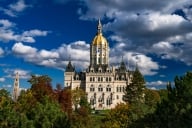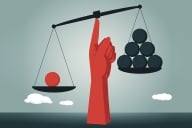You have /5 articles left.
Sign up for a free account or log in.

ajlber/Istock/Getty Images Plus
Society is often a mirror, reflecting what we collectively value. Athletes are celebrated and revered, their physical prowess and competitive spirit held up as a testament to human achievement. For a timely example, just think of all the public attention directed toward basketball over the past weeks of March Madness, culminating in the upcoming National Collegiate Athletic Association’s Final Four games.
But what if this acclaim was shared equally with another group of influencers: our teachers? What if we, as a society, esteemed educators as highly as we do athletes?
In this piece, I envision a hypothetical society where teachers are revered as highly as athletes, reassigning the respect and admiration usually bestowed upon physical prowess to intellectual capability and the art of teaching. I use some hyperbole to highlight the divergence between our present societal norms and an imaginary future in order to consider how transformative such a redirection would be. I don’t mean to belittle sports or athletes; rather, I seek to emphasize the potential benefits of funneling similar levels of passion, resources and attention into the field of education.
So let’s visualize a world where a phrase like “He’s the Zach Edey of sociology!” or “She’s the Caitlin Clark of physics!” is not a ludicrously lofty ideal but a common expression that encapsulates the respect and admiration we harbor for exceptional educators. Imagine living in a world where the measure of a person’s worth is not confined to physical strength, but rather expanded to the world of intellectual capability and the power of teaching. What if the same passion, financial resources and attention that we pour into professional sports were instead focused on our educators and the pivotal role they play in shaping the future? It’s an enticing vision, to be sure. And it’s one worth exploring.
In a society where college and university instructors receive as much recognition as sports stars, it isn’t difficult to envision the vast implications. First, we would see an immediate and dramatic increase in the attractiveness of the teaching profession. A newfound prestige would accompany the role of educators, enticing a surge of talent into the sector. This influx of much greater numbers of impassioned, respected and well-resourced educators would lead to enriched, effective and inspiring teaching and learning for many more people.
The increased investment in education would lead to a well-funded and well-resourced sector. Smaller class sizes, state-of-the-art learning technology and robust support systems for students would become the norm rather than the exception. Teachers would also be rewarded with higher salaries, encouraging them to continually innovate and improve their teaching methods.
Education would become a field of play where the stakes are high, competition is fierce, and the rewards are great. For those wondering how competition could fit into the landscape of education, we can draw parallels from the world of sports. Just as athletes continually seek to outdo their personal best and set new records, teachers could engage in friendly competitions to see who can bring about the most progress in their students’ understanding, critical thinking skills and overall knowledge. We could even have league tables ranking instructors on their talents for inspiring students, fostering creativity and facilitating deep and long-lasting learning.
To make this idea more concrete, consider televised “education matches,” or Pedagogical Playoffs, where leading teachers across various disciplines demonstrate their teaching skills. Students could be presented with complex problems, and these matches could become an opportunity to spotlight the beauty of the learning process, where the journey to the solution is just as important as the solution itself. It would be a chance to highlight that learning is not about rote memorization, but about fostering nuanced understanding, nurturing curiosity and honing critical thinking skills.
A Ripple Effect
Now, let’s talk about the social impact, which would be nothing short of transformative. Education would no longer be considered a chore or a necessary evil, but rather a celebrated, communal event. Just as we gather to watch a Final Four game or a World Cup match, we would come together to watch, learn and engage in intellectual pursuits. This paradigm shift would create a ripple effect in society—inspiring a culture that values learning, intellect and the development of human potential.
Education is not just a process or a system, but the bedrock upon which we build our society. It’s a tool of societal advancement, carving paths for future leaders, innovators, artists and thinkers. At the heart of this transformative process stand teachers—individuals who influence the minds that will innovate tomorrow. These educators, in the grandest sense, are every bit as heroic as the athletes we cheer for on the field.
Now, imagine a society that truly understands this. A society that sees the value in its educators and invests in them with the same fervor and enthusiasm that it does in its athletes. What would that look like? Perhaps it would herald an era of the Education Super Bowl, the Teaching World Cup and the Instructional Olympics. Maybe we would see education stadiums filled with cheering fans, celebrating innovative teaching methods and applauding breakthroughs in student understanding. Sure, it might seem like quite a stretch today, as fanciful as flying cars and cities on Mars, but every reality starts as someone’s daydream.
In such a world, we are not merely changing our perception of education; we are transforming our perception of society and its potential for the future. We’re acknowledging that those who ignite curiosity, impart knowledge, and nurture critical thinking are as integral to our societal fabric as those who score goals, break records and win medals.
Admittedly, this sounds like a utopian dream, an ideal that veers far from our present reality. But remember, as a society collectively aspiring to recognize and elevate our educators, every significant change begins with imagining the possibility. If we can visualize a world where instructors are as valued and esteemed as athletes, we can start the necessary dialogues, formulate plans and make the shifts needed to turn this vision into reality.
We have within us the power to redefine societal values, to shift what and whom we celebrate, and alter our collective aspirations. It’s time we—educational leaders, policymakers, community advocates and engaged citizens—leveraged that power to invest in the educators who shape our future in their classrooms. Because, ultimately, a society that places teachers on the same pedestal as athletes is a society that understands the true value of the future. It is a society that appreciates the weight and worth of the task of empowering minds and that recognizes the impact of this task on the trajectory of humanity.
By valuing our teachers as much as our athletes, we’re not just investing in education—we’re investing in the potential of generations to come. It’s a goal that may seem lofty, but it’s one that we should strive for if we truly aim to build a society that understands the value of its future.








